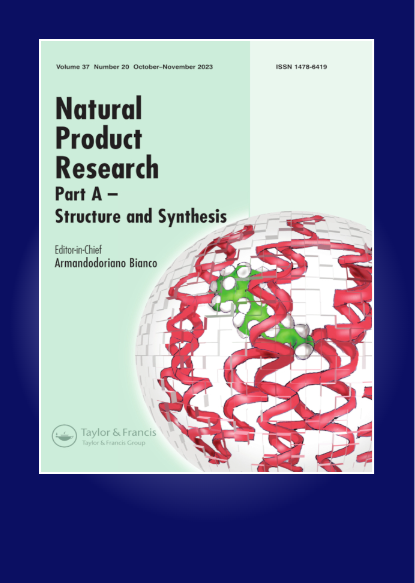Flavonoids, biphenyls and xanthones from the genus Clusia: chemistry, biological activities and chemophenetics relevance
IF 1.9
3区 化学
Q3 CHEMISTRY, APPLIED
引用次数: 0
Abstract
Clusia is one of the most important genera of the Clusiaceae family, comprising up to 400 species. This review describes the identification of twenty-two flavonoids from Clusia species, which includes five flavonols (1-4 and 11), six flavones (5-10), one catechin (12), one flavanone (13), and nine biflavonoids (14-22). O- and C-glycosylation are frequently observed amongst these flavonoids. Furthermore, seven biphenyls (23-29) and nine xanthones (30-38) have been isolated from Clusia species. Biphenyls and xanthones show limited occurrence within the genus, but together with biosynthetic insights, they might offer important chemophenetics leads for the consolidation of the genus Clusia within the Clusiaceae family. Altogether, this work provides an overview of the chemistry of the genus Clusia in terms of flavonoids, biphenyls and xanthones, as well as it discusses biological activities and chemophenetics of the isolated compounds, when appropriate.
Clusia 属中的黄酮类化合物、联苯类化合物和黄酮类化合物:化学、生物活性和化学遗传学相关性。
Clusia 是 Clusiaceae 家族中最重要的属之一,有多达 400 个物种。本综述介绍了从 Clusia 属植物中鉴定出的 22 种黄酮类化合物,其中包括 5 种黄酮醇(1-4 和 11)、6 种黄酮(5-10)、1 种儿茶素(12)、1 种黄烷酮(13)和 9 种双黄酮(14-22)。在这些黄酮类化合物中,经常可以观察到 O-和 C-糖基化现象。此外,还从 Clusia 物种中分离出 7 种联苯(23-29)和 9 种黄酮(30-38)。联苯类和氧杂蒽酮类化合物在该属中的出现有限,但它们与生物合成的深入研究一起,可能会为 Clusiaceae 家族中 Clusia 属的整合提供重要的化学表观学线索。总之,本研究从黄酮类化合物、联苯类化合物和氧杂蒽酮类化合物的角度概述了 Clusia 属的化学成分,并酌情讨论了分离化合物的生物活性和化学遗传学。
本文章由计算机程序翻译,如有差异,请以英文原文为准。
求助全文
约1分钟内获得全文
求助全文
来源期刊

Natural Product Research
化学-医药化学
CiteScore
5.10
自引率
9.10%
发文量
605
审稿时长
2.1 months
期刊介绍:
The aim of Natural Product Research is to publish important contributions in the field of natural product chemistry. The journal covers all aspects of research in the chemistry and biochemistry of naturally occurring compounds.
The communications include coverage of work on natural substances of land and sea and of plants, microbes and animals. Discussions of structure elucidation, synthesis and experimental biosynthesis of natural products as well as developments of methods in these areas are welcomed in the journal. Finally, research papers in fields on the chemistry-biology boundary, eg. fermentation chemistry, plant tissue culture investigations etc., are accepted into the journal.
Natural Product Research issues will be subtitled either ""Part A - Synthesis and Structure"" or ""Part B - Bioactive Natural Products"". for details on this , see the forthcoming articles section.
All manuscript submissions are subject to initial appraisal by the Editor, and, if found suitable for further consideration, to peer review by independent, anonymous expert referees. All peer review is single blind and submission is online via ScholarOne Manuscripts.
 求助内容:
求助内容: 应助结果提醒方式:
应助结果提醒方式:


